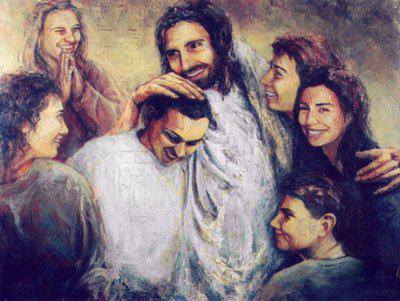Did Jesus Have Biological Siblings?
The question of whether Jesus had biological siblings is a topic of debate among scholars and theologians. Some people believe that Jesus had brothers and sisters, while others argue that the references to siblings in the Bible actually refer to close relatives or friends.
This article will explore the evidence for and against the idea that Jesus had biological siblings.
The Biblical Evidence
The Bible mentions Jesus’ brothers and sisters in several passages. For example, in Mark 6:3, Jesus is referred to as the “son of Mary” and is said to have brothers named James, Joseph, Judas, and Simon, as well as unnamed sisters. Similarly, in Matthew 13:55–56, Jesus’ siblings are named James, Joseph, Simon, and Judas, with sisters, also mentioned.
However, some scholars argue that these references do not necessarily imply that Jesus had biological siblings. Instead, they say that in ancient Jewish culture, the words “brother” and “sister” were often used to mean close relatives or friends, not just biological siblings. Additionally, it is worth noting that in both Mark and Matthew’s accounts, the sisters are not named, which could be seen as unusual if they were indeed Jesus’ biological siblings.
The argument about whether or not Jesus had biological siblings is complicated and has many sides. It requires a careful look at both the Bible and historical evidence. In the following sections of this article, we will explore these issues in greater detail, providing readers with a comprehensive overview of the various arguments and perspectives on this topic.

The Historical Context
Understanding the historical context of Jesus’ society is important in determining whether he had biological siblings. In ancient Jewish culture, family relationships were highly valued and emphasized.
However, the terms “brother” and “sister” could be used in a wider sense to refer to anyone in a person’s extended family or social circle, including cousins, nephews, and close friends. This practice is still common in many cultures today.
Furthermore, the idea of the perpetual virginity of Mary, the mother of Jesus, has been an important theological concept in some Christian denominations for centuries. The belief is that Mary remained a virgin throughout her life, even after giving birth to Jesus.
This doctrine has influenced the interpretation of biblical passages that mention Jesus’ siblings, with some scholars suggesting that the siblings mentioned in these passages may have been step-siblings or half-siblings.
Theological Implications
The question of whether Jesus had biological siblings has theological implications for some Christian denominations. In particular, the doctrine of the perpetual virginity of Mary is central to the beliefs of some groups, including the Roman Catholic Church and the Eastern Orthodox Church. These churches teach that Mary remained a virgin throughout her life and did not have any other children after Jesus.
However, other Christian denominations do not place as much emphasis on the doctrine of the perpetual virginity of Mary and interpret the passages about Jesus’ siblings more literally. This has led to differences of opinion among Christians about whether Jesus had biological siblings.
In addition to the question of the perpetual virginity of Mary, the debate over whether Jesus had biological siblings also has implications for the nature of Jesus’ family relationships and his role as the son of God.
Some scholars argue that the idea of Jesus having biological siblings would humanize him and make him more relatable to ordinary people. Others suggest that the concept of Jesus as an only child reinforces his divine status as the unique son of God.
Understanding the theological implications of the question of whether Jesus had biological siblings is important for anyone interested in biblical studies or Christian theology. In the following sections of this article, we will explore the different interpretations and perspectives on this topic, providing readers with a well-rounded understanding of the issue.
Interpretations of Biblical Passages
The passages in the Bible that mention Jesus’ siblings are open to interpretation and have been interpreted differently by scholars and theologians over the centuries. The most commonly cited passages are found in the New Testament Gospels of Matthew and Mark, where Jesus’ mother and brothers are mentioned.
In Matthew 12:46-50, Jesus is teaching a crowd when his mother and brothers arrive, seeking to speak with him. In Mark 3:31-35, a similar event takes place, with Jesus’ mother and brothers asking to speak with him.
Some scholars argue that the term “brothers” used in these passages refers to Jesus’ biological siblings, while others suggest that the term refers to close relatives or even spiritual brothers. Additionally, some scholars argue that the word “brothers” may have been used to refer to disciples or followers of Jesus, rather than biological family members.
Historical Evidence
In addition to the biblical passages, there is also historical evidence that suggests that Jesus may have had biological siblings. The early church father Origen, writing in the third century, refers to the “brothers of Jesus” as being the sons of Mary and Joseph.
Similarly, the fourth-century theologian Jerome argued that Jesus had biological siblings, although he believed that they were either Joseph’s children from a previous marriage or close relatives.
Other historical evidence, however, suggests that the siblings mentioned in the Bible may not have been Jesus’ biological siblings. For example, the second-century writer Hegesippus suggested that James, who is referred to as the “brother of the Lord” in the New Testament, was actually a cousin of Jesus.
Overall, the question of whether Jesus had biological siblings remains a topic of debate among scholars and theologians. While some argue that there is clear evidence in the Bible and historical writings that Jesus had siblings, others interpret the evidence differently and believe that the siblings mentioned in the Bible may have been step-siblings, half-siblings, or close relatives.
Understanding the different interpretations and perspectives on this topic is important for anyone interested in biblical studies or Christian theology.
Conclusion
In conclusion, the question of whether Jesus had biological siblings remains a topic of debate and discussion among scholars and theologians.
While some argue that there is clear evidence in the Bible and historical writings that Jesus had siblings, others interpret the evidence differently and believe that the siblings mentioned in the Bible may have been step-siblings, half-siblings, or close relatives. Understanding the different interpretations and perspectives on this topic is important for anyone interested in biblical studies or Christian theology.
Ultimately, the question of whether Jesus had biological siblings may never be definitively answered, but by exploring the available evidence and interpretations, we can gain a deeper understanding of the historical and religious context surrounding Jesus’ life and teachings.

Sangtea Hmar is a passionate leader of the Youth Christian Fellowship at the Electric Vengthlang Presbyterian Church in Aizawl, Mizoram, India. He is the owner of Christiantone.com and is committed to spreading the word of God. He loves to mentor youth and help them grow in their faith.






